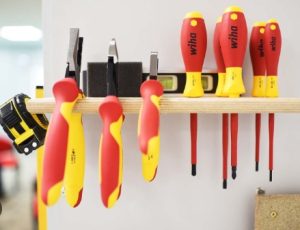Our Location
304 North Cardinal St.
Dorchester Center, MA 02124

Electricians rely on a wide variety of specialized tools to ensure safety, efficiency, and precision in their work. From basic hand tools to advanced testing devices, professional electricians need the best equipment to tackle the increasingly complex tasks in modern electrical systems. This guide will dive into the essential tools for professional electricians, focusing on leading brands and models widely recognized for their reliability and performance.
Hand tools are the backbone of an electrician’s toolkit. Whether stripping wires, tightening connections, or installing switches, these tools play a crucial role in day-to-day tasks.
Wire strippers are essential for safely removing the insulation from electrical wires without damaging the conductor.
Pliers are versatile tools used for gripping, bending, and cutting wires. Different types of pliers offer various capabilities.
Electricians need insulated screwdrivers for safety when working on live electrical circuits.
Measuring accurately is critical when running electrical wiring through walls or ceilings.
Power tools help electricians work faster and more efficiently, especially when drilling holes or driving screws into tough materials.
Cordless drills are vital for installing anchors, driving screws, and drilling through a variety of materials.
Impact drivers are essential for driving screws quickly into hard materials, such as concrete or metal.
Electricians need cable cutters for cutting through thick electrical wires or cables efficiently.
Testing and measuring tools are essential for ensuring that electrical systems function correctly and safely. These tools allow electricians to diagnose issues and confirm that installations meet regulatory standards.
Multimeters are versatile tools used to measure voltage, current, and resistance in electrical circuits.
Voltage testers are essential for detecting the presence of voltage in wires, outlets, or switches.
Circuit testers are used to verify that electrical outlets are properly wired and safe to use.
Clamp meters allow electricians to measure current without disconnecting wires, offering safety and convenience.
Safety is a top priority for electricians, and specialized tools ensure protection when working with live electrical circuits.
Insulated gloves protect electricians from electrical shock when working on live circuits.
Hard hats provide essential protection from falling objects and accidental head impacts on job sites.
Protecting the eyes from sparks, debris, and electrical arcs is essential when working on electrical installations.
Electricians need a well-organized toolbox to access tools quickly and efficiently. High-quality tool belts, bags, and storage solutions can significantly improve productivity.
Tool belts allow electricians to keep essential tools within reach while working.
Tool bags keep tools organized and protected from damage during transport and on the job site.
Electricians also benefit from portable toolboxes that provide secure storage for their larger tools.

As electrical systems become more sophisticated, electricians require advanced tools to ensure their installations and repairs meet today’s standards. These tools help electricians diagnose, test, and troubleshoot complex electrical issues.
Thermal cameras are used to detect hot spots in electrical panels, circuits, and components, which can indicate potential failures or fire hazards.
Circuit analyzers test the overall health of electrical systems and can detect issues such as faulty wiring, power quality problems, and overloaded circuits.
Insulation testers are used to assess the integrity of electrical insulation in wiring, transformers, and motors. They are crucial for preventing electrical leakage and ensuring system safety.
Electricians sometimes need tools for highly specific tasks, such as bending conduit or pulling wire through walls. These specialty tools make certain tasks easier and more efficient.
Conduit benders are used to shape electrical conduit into curves and angles to fit around obstacles in building structures.
Fish tapes are used to pull wiring through walls, conduit, or other tight spaces where running cable by hand is difficult.
Hole saws are used to create holes for running electrical conduit, boxes, or wiring through walls and other materials.
When choosing tools for electrical work, professionals often turn to trusted brands that deliver performance, durability, and innovation. Below are some leading brands recognized in the electrician’s tool industry:
A brand with a long history in the industry, Klein Tools is synonymous with high-quality, durable tools designed specifically for electricians. Their product line includes everything from hand tools to testing instruments.
Fluke is a world leader in the production of professional electronic testing equipment. Their tools are trusted for their accuracy and reliability.
Milwaukee is known for producing tough, reliable power tools and hand tools that are designed to withstand the rigors of professional use.
DeWalt’s power tools are widely used across various industries, including electrical work. Their tools are known for their durability and cutting-edge technology.
Greenlee specializes in tools for the electrical industry, offering a wide range of products that make electrical installations and maintenance easier and more efficient.
Professional electricians rely on a broad range of tools to perform their work safely and efficiently. From basic hand tools like pliers and screwdrivers to advanced diagnostic equipment such as thermal imagers and circuit analyzers, the right tools make all the difference in ensuring that electrical systems are installed, maintained, and repaired to the highest standards.
Choosing tools from trusted brands like Klein Tools, Fluke, Milwaukee, DeWalt, and Greenlee ensures reliability, safety, and efficiency. Electricians must invest in high-quality, durable tools that meet industry standards and perform consistently in various conditions. Whether for residential, commercial, or industrial applications, the tools outlined in this guide represent the essential equipment every professional electrician should have in their toolkit.
